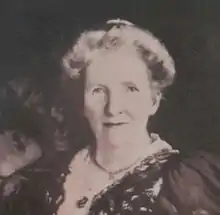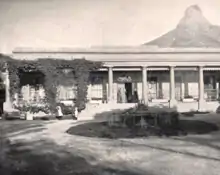Georgiana Solomon
Georgiana Margaret Solomon (née Thomson; born 18 August 1844 – 24 June 1933) was a British educator and campaigner, involved with a wide range of causes in Britain and South Africa. She and her only surviving daughter, Daisy Solomon, were suffragettes; as members of the Women's Social and Political Union, they were imprisoned during the campaign for women's suffrage for breaking the windows of Black Rod's office.
Georgiana Solomon | |
|---|---|
 Detail from a painting by her son William | |
| Born | Georgiana Margaret Thomson 18 August 1844 near Kelso, Scotland |
| Died | 24 June 1933 |
| Nationality | British, South African |
| Occupation | School principal, suffragette |
| Spouse(s) | Saul Solomon |
| Children | 6 (including Daisy Solomon) |
Early life
Georgiana Thomson was born near Kelso in Scotland to George Thomson and Margaret Stuart Thomson (née Scott). The Oxford Dictionary of National Biography characterises her father as "an unsuccessful gentleman farmer". She was educated at a small boarding school in Edinburgh.[1][2]
Career
She began her teaching career at the same school where she had been educated. Later, she accepted a position as a governess in a Liverpool family.[1] By the 1870s, the movement to expand education to young women was gaining momentum in the English-speaking world. A committee in the Cape Colony was setting up the first such establishment, and, through Reverend Andrew Murray, approached her to lead it. She decided to accept the challenge, and emigrated in 1873 to South Africa. She was the inaugural principal of what is now the Good Hope Seminary High School.
Marriage and children

There she met the liberal politician and newspaper proprietor Saul Solomon, known for his belief in equality based on creed, colour or class.[3] Their views tallied on many matters, not least girls' education: he owned a first edition of Mary Wollstonecraft's polemic A Vindication of the Rights of Woman.[4] Despite his being almost twice her age, they married. The wedding, which took place on 21 March 1874 at his home, Clarensville House, was to have had an alteration to the standard Anglican marriage vows: neither wife nor husband wished her to promise to obey him. However, the two clergymen officiating told the couple that this would render the ceremony without authority, so the words were included.[5] One historian describes their marriage as "idyllic".[6]
The couple had six children: Saul, who became a judge in the Supreme Court of South Africa; Margaret; George; William Ewart Gladstone, a painter who followed his mother into educational leadership as principal of the Bombay School of Art;[7] Daisy, a suffragette; and a son who died in infancy.[1] In 1881 the eldest daughter drowned - as did the governess who tried to rescue the child.[8] Saul retired from public life, and the family moved to Bedford in England in 1888, where their sons attended Bedford School. Saul died in 1892, leaving Georgiana with four children to raise. She made a home for them, first at Sidcup, Kent (now part of Outer London) and then in West Hampstead (now Inner London). She lived as a widow for over 40 years.[1]
Activism
.jpg.webp)
Georgiana Solomon married into a large family and surrounded herself with educated women. These included Emilie Solomon, first female chair of the Congregational Union;[9] Mary Brown, a great friend of Olive Schreiner;[10] Schreiner herself, author of The Story of An African Farm; Alice Matilda Greene, teacher and campaigner; and Elizabeth Maria Molteno.
Her first reform activities were around the issues of prostitution and alcoholism. The social purity and temperance movements were at their height. (For context, the Ladies National Association for the Repeal of the Contagious Diseases Acts was established in 1869 by Elizabeth Wolstenholme and Josephine Butler.) She spoke for the Women's Christian Temperance Union, eventually becoming the president of the Cape Colony chapter and, from 1925 to 1931, a world vice-president.[11]
In 1902 Solomon returned to visit South Africa, where she assisted in the campaign for women's suffrage. On 16 October 1904 she co-founded the Suid-Afrikaanse Vrouefederasie (South African Women's Federation) with Annie Botha,[12] wife of the first prime minister of the Union of South Africa. The charity is still in existence.[13]
Back in England, Georgiana and Daisy Solomon both joined the Women's Social and Political Union in 1908, and the following year Georgiana was involved in two unsuccessful deputations to the Prime Minister. The first was in March and the second was on 18 November 1910 (Black Friday), when the deputation was led by Emmeline Pankhurst to petition Prime Minister Asquith. Solomon was in the front of the delegation[14] as they entered the Speaker's Entrance and was told that Asquith was not present, she asked to see Colonel Seely whom she knew. Seely came out and listened politely but would not send for a Minister to meet the delegation. Solomon then asked for another acquaintance Mr. Birrell[14] and also wrote a note on House of Commons headed notepaper to be delivered to the Prime Minister as follows:
“Dear sir, – I have the honour address you in writing, because I learn that you are not at present in the House. I therefore am unable have the privilege of seeing you. May therefore enclose the resolution which was deputed to lay before you by the Women’s Parliament Caxton Hall, and to request that you will give the same earnest consideration.”[14]
Participants included Dr Elizabeth Garrett Anderson, Dr Louisa Garrett Anderson, Anne Cobden-Sanderson, Princess Sophia Duleep Singh, Dorinda Neligan and Hertha Ayrton.[15]
On 4 March 1912 she began a one-month sentence in Holloway Prison for breaking nine windows in the House of Lords. The office attacked was that used by Black Rod.[1] She left the WSPU in 1913, but remained active in other suffrage organisations as well as the social purity movement.
She maintained her involvement in South African developments from her base in London. She offered hospitality to the visiting delegation led by William Schreiner who had come to London to press for equal suffrage for all races. She opposed the South Africa Act 1909 which limited the franchise (unlike the Cape Qualified Franchise). This is when she grew to know Gandhi. She opposed the Natives Land Act, 1913, thinking the colour bar "un-British". She served on the leadership of the Aborigines' Protection Society,[16] where she worked with Jane Cobden Unwin.[4]
Solomon died in Eastbourne.[1]
Works
- Echoes of Two Little Voices (1883), poetry concerning the early deaths of her children.
References
- van Heyningen, Elizabeth (May 2006). "Solomon, Georgiana Margaret (1844–1933)", Oxford Dictionary of National Biography.
- Davies, Gwendolyn (13 August 2015). Fiction treasures by Maritime writers : best-selling novelists from Canada's Maritime Provinces: 1860-1950. Halifax, Nova Scotia, Canada. p. 341. ISBN 9781459503762. OCLC 897576505.
- Stanley Trapido, Stanley (May 2006). "Solomon, Saul (1817–1892)", Oxford Dictionary of National Biography.
- Elizabeth Crawford (2 September 2003). The Women's Suffrage Movement: A Reference Guide 1866-1928. Routledge. pp. 643–. ISBN 1-135-43402-6.
- Solomon, William Ewart Gladstone (1948). Saul Solomon: "the member for Cape Town.". OUP. p. 154.
- Simons, Phillida Brooke (1995). Old Mutual, 1845-1995. Human & Rousseau.
- Krishna Chaitanya, 1918- (1976–1994). A history of Indian painting. New Delhi: Abhinav Publications. ISBN 8170173108. OCLC 2525402.
- Enthusiams"" by Mark Girouard, 2011
- Christianity in South Africa : a political, social, and cultural history. Elphick, Richard., Davenport, T. R. H. Berkeley, Calif.: University of California Press. 1997. ISBN 0852557507. OCLC 38284545.CS1 maint: others (link)
- "Mary Brown (nee Solomon)". The Olive Schreiner Letters Online.
- jonas (27 August 2012). "The first branch of the Suid-Afrikaanse Vrouefederasie (SAVF), a women's welfare and cultural organisation which comes into bei". South African History Online. Retrieved 17 November 2017.
- intern (26 June 2013). "Suid-Afrikaanse Vrouefederasie". NGO Pulse. Retrieved 26 July 2019.
- Blake, Trevor (1 August 2018). "In Front of the Party was Miss Dora Marsden". Union Of Egoists. Retrieved 28 February 2020.
- Sybil Oldfield, ‘Neligan, Dorinda (1833–1914)’, Oxford Dictionary of National Biography, Oxford University Press, 2004 accessed 17 Nov 2017
- ODNB
.jpg.webp)